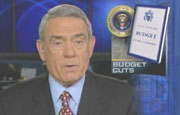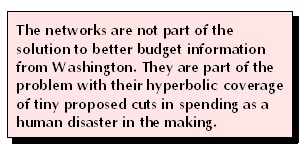 |
|||||||||
|
 |
||
|
 |
||||||||||||||||||||||||
|
||||||||||||||||||||||||
 |
||||||
|
||||||
 |
||||||
|
 |
||||||||||||||||||
|
||||||||||||||||||
 |
||||||||||||||||||||||||
|
||||||||||||||||||||||||
 |
||||||||||||||||||
|
||||||||||||||||||
|
|
|
For Immediate Release: Tim Scheiderer (703) 683-5004 - Friday, February 11, 2005

Budget Coverage Is Low on Big-Picture Numbers, High on Hyperbole About Government Beneficiaries
Is Bush "Ripping the
The actual "wide swath" picture shows only minuscule cuts. The official White House budget document summarizes its proposed cuts will save "about $20 billion in 2006," less than one percent of the $2.5 trillion proposal. Cato Institute budget analyst Chris Edwards claimed, "The Bush budget underscores how out of control federal spending is. The budget is being billed as the tightest yet, but overall spending is projected to rise 3.6 percent in 2006 even without further money for Iraq."
■ Cuts or consolidations of programs aren't "eliminations" of an entire area of spending. On NPR's Morning Edition Monday, co-anchor Renee Montagne suggested the White House "would eliminate or reduce spending on dozens of government programs, including education, farm subsidies, and health care for veterans and the poor." Couldn't the public get the impression that the White House favors elimination of spending on education, farmers, health care, and the poor? That would be a very inaccurate impression of spending trends under Bush. ■ Caps aren't cuts. On Monday's CBS Evening News, Dan Rather displayed his statistical confusion for everyone to see: "The President's budget would cut aid to farmers sharply. He'd lower the cap on their annual subsidies from $360,000 to $250,000 year. That's a cap." While a cap may be a cut to beneficiaries - in this case, very wealthy farmers - for taxpayers, it is not necessarily an actual cut in the budget. The same goes for NBC's O'Donnell, who included among the cuts tightening "eligibility of food stamps for the poor." That might affect beneficiaries, but it doesn't necessarily stop the overall food-stamp budget from increasing. ■ There's no numbers, just hyperbole. Lee Cowan's Monday night report on CBS was too typical: it included no actual budget numbers, and focused its attention on hyperventilating government beneficiaries. Five talking heads lamented the proposed cuts. No one argued they weren't cutting enough. Minneapolis Mayor R. T. Rybak complained, in a typical flourish, "This isn't strengthening America's communities. It's ripping the heart out of those who are the heart of this community." What are the proposed cuts in urban spending? CBS did not elaborate. Has the government budget in Minneapolis gone down recently? CBS didn't say. ■ Every human illustration of the budget seems to be a spending-cut victim, not tax-hike victims or debt-burden victims. Reports like Lee Cowan's not only excluded conservative budget experts or politicians. In their attempt to locate the "hardest hit" in the budget process, they never seem to highlight people who lose from an increase in government spending, taxes, or debt burdens. That's not "fair and balanced." The networks are not a part of the solution to better budget information from Washington. They are part of the problem. Their hyperbolic coverage of tiny spending cuts as a human disaster in the making isn't objective political analysis. It's liberal political advertising.
Home | News Division
| Bozell Columns | CyberAlerts |







 This week's release of the White House budget proposal is only the latest tired example of how the national media distort the federal spending picture. On Monday morning's
Today, NBC reporter Norah O'Donnell warned, "The President is proposing today the tightest budget of his presidency and it's gonna slash spending across, across a wide swath of the government."
This week's release of the White House budget proposal is only the latest tired example of how the national media distort the federal spending picture. On Monday morning's
Today, NBC reporter Norah O'Donnell warned, "The President is proposing today the tightest budget of his presidency and it's gonna slash spending across, across a wide swath of the government." But TV coverage portrays this initial proposal - to which Congress will inevitably add more spending - as an impending war on the needy. Here's a few typical distortions quick and dirty budget reports make:
But TV coverage portrays this initial proposal - to which Congress will inevitably add more spending - as an impending war on the needy. Here's a few typical distortions quick and dirty budget reports make: